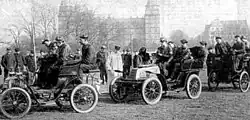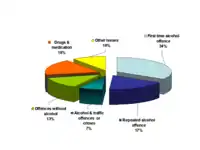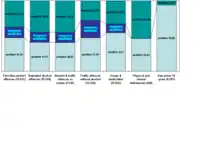Medical-psychological assessment (Germany)
In Germany, a medical-psychological assessment (German: Medizinisch-Psychologische Untersuchung, or "MPU") is used by the authorities in deciding whether to revoke or reissue a driving license. Medical-psychological assessment has been shown to be highly effective at reducing the recidivism rate for drunk drivers.[1] Drivers who are identified as potentially unfit may have their driver's license suspended and must satisfactorily complete an MPU to get their license reinstated. MPUs are commonly required due to drug- and alcohol-related offenses, or any other offenses that demonstrate a potential lack of maturity and judgment to safely participate in traffic.
The MPU is colloquially referred to as the "Idiot test" (German: Idiotentest), while the law refers to it as an "Assessment of Fitness to Drive" (German: Begutachtung der Fahreignung).

History
The first standards mandating the MPU for certain prospective drivers were legally adopted in 1955. Its stated purpose was to improve traffic safety and reduce the number of accidents by identifying unfit dangerous drivers and removing them from traffic until fitness to drive was restored.

The MPU has an interdisciplinary basic approach. Although it is a punishment, it offers the offender the chance to rehabilitate themselves.[2] German medical-psychological institutes perform about 100,000 MPUs a year. Many of their clients have to take the MPU twice because more than 50% fail to get a positive opinion on their first try.
Drunk drivers
Alcohol offenders can only successfully complete an MPU after demonstrably reducing their alcohol consumption. The change in drinking behaviour must be stabilised and motivationally consolidated. Passing the MPU is not easy: drivers arrested with a blood alcohol level of 0.16% or more may in some instances be required to establish that they have been completely abstinent for at least one year; test administrators corroborate drivers' formal statements as to their abstinence by measuring their liver function levels and conducting random urine screenings.[3]
Other causes
A conviction for driving while impaired is not the only scenario in which the MPU can be required. Drivers who fail a drug test, even without operating a vehicle under the influence, can be required to obtain a favorable MPU opinion by a certain deadline (usually several weeks after an incident) or face suspension of their driver's licenses. This justification for requiring an MPU opinion enables the government to suspend the licenses of many alcoholics who were not apprehended while driving drunk. Bicyclists participating in traffic with a blood alcohol level of 0.16% or greater can also be required to undergo an MPU.[4]

Also, in addition to justification, an MPU (which is much more often passed than alcohol-related MPUs) is necessary if someone wants a dispensation from the minimum driving age.
MPUs have also been required for offenders who have committed repeated traffic offenses that demonstrate a lack of respect for the law, such as a driver who collected 17 speeding tickets and 127 parking violations in one-and-a-half years.[5]
Measures
If possible, the MPU gives a clear recommendation to the offender to attend a specific course to re-establish his or her fitness to drive.[6] These courses are well adapted to the specific problems of the offenders: Alcohol, drugs, or other traffic safety violations.
Other countries
In Russia, all professional drivers must pass a similar test at 2-year intervals.
References
- alcalc. "Medical screening and medical-psychological assessment as prerequisites for regranting of licences; Alcohol & Alcoholism Vol. 31, No. 6, pp. 605-607, 1996" (PDF). Archived from the original (PDF) on March 4, 2016.
- "Müller & Laub 2006. The Medical Psychological Assessment: An Opportunity for the Individual, Safety for the General Public" (PDF). Archived from the original (PDF) on 2012-02-08. Retrieved 2007-12-12.
- mpu-berlin-vorbereitung.de. "MPU Vorbereitung in Deutschland aus Berlin" (in German). Retrieved 18 March 2021.
- "Fahrradfahren nach Führerscheinentzug erlaubt". autogazette.de. 9 August 2011. Retrieved 3 June 2019.
- "Recht: Häufiges Falschparken". Die Welt (in German). 6 August 2014. Retrieved 3 June 2019.
- Krohn 2006. Courses for the re-establishment of fitness to drive with legal consequences